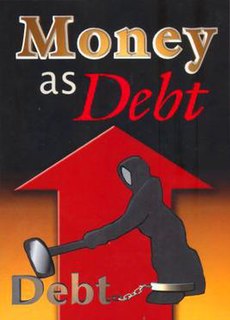
In economics, the money supply is the total value of monetary assets available in an economy at a specific time. There are several ways to define "money", but standard measures usually include currency in circulation and demand deposits.
Debt relief or debt cancellation is the partial or total forgiveness of debt, or the slowing or stopping of debt growth, owed by individuals, corporations, or nations.

Full-reserve banking is a proposed alternative to fractional-reserve banking in which banks would be required to keep the full amount of each depositor's funds in cash, ready for immediate withdrawal on demand. Funds deposited by customers in demand deposit accounts would not be loaned out by the bank because it would be legally required to retain the full deposit to satisfy potential demand for payments. Proposals for such systems generally do not place such restrictions on deposits that are not payable on demand, for example time deposits.
The reserve requirement is a central bank regulation employed by most, but not all, of the world's central banks, that sets the minimum amount of reserves that must be held by a commercial bank. The minimum reserve is generally determined by the central bank to be no less than a specified percentage of the amount of deposit liabilities the commercial bank owes to its customers. The commercial bank's reserves normally consist of cash owned by the bank and stored physically in the bank vault, plus the amount of the commercial bank's balance in that bank's account with the central bank.
Money creation is the process by which the money supply of a country, or of an economic or monetary region, is increased. In most modern economies, most of the money supply is in the form of bank deposits. Central banks monitor the amount of money in the economy by measuring the so-called monetary aggregates.
Lawrence H. White is an American economics professor at George Mason University who teaches graduate level monetary theory and policy. He is considered an authority on the history and theory of free banking. His writings support the abolition of the Federal Reserve System and the promotion of private and competitive banking.
Modern Monetary Theory or Modern Money Theory (MMT) is a heterodox macroeconomic theory that describes currency as a public monopoly for a government and unemployment as the evidence that a currency monopolist is restricting the supply of the financial assets needed to pay taxes and satisfy savings desires. MMT is seen as an evolution of chartalism and is sometimes referred to as neo-chartalism.

Joseph Huber is the chair of economic and environmental sociology at Martin Luther University of Halle-Wittenberg, Germany.

Credit theories of money are monetary economic theories concerning the relationship between credit and money. Proponents of these theories, such as Alfred Mitchell-Innes, sometimes emphasize that money and credit/debt are the same thing, seen from different points of view. Proponents assert that the essential nature of money is credit (debt), at least in eras where money is not backed by a commodity such as gold. Two common strands of thought within these theories are the idea that money originated as a unit of account for debt, and the position that money creation involves the simultaneous creation of debt. Some proponents of credit theories of money argue that money is best understood as debt even in systems often understood as using commodity money. Others hold that money equates to credit only in a system based on fiat money, where they argue that all forms of money including cash can be considered as forms of credit money.
Stephen A. Zarlenga was a researcher and author in the field of monetary theory, trader in stock and financial markets, and advocate of monetary reform.
A credit crunch is a sudden reduction in the general availability of loans or a sudden tightening of the conditions required to obtain a loan from banks. A credit crunch generally involves a reduction in the availability of credit independent of a rise in official interest rates. In such situations, the relationship between credit availability and interest rates changes. Credit becomes less available at any given official interest rate, or there ceases to be a clear relationship between interest rates and credit availability. Many times, a credit crunch is accompanied by a flight to quality by lenders and investors, as they seek less risky investments.

Money as Debt is a 2006 animated documentary film by Canadian artist and filmmaker Paul Grignon about the monetary systems practised through modern banking. The film presents Grignon's view of the process of money creation by banks and its historical background, and warns of his belief in its subsequent unsustainability. Subsequent Money as Debt videos include Money as Debt II Promises Unleashed (2009) and Money as Debt III: Evolution Beyond Money (2011).
The Chicago plan was a collection of banking reforms suggested by University of Chicago economists in the wake of the Great Depression. A six-page memorandum on banking reform was given limited and confidential distribution to about forty individuals on 16 March 1933. The plan was supported by such notable economists as Irving Fisher, Frank H. Knight, Lloyd W. Mints, Henry Schultz, Henry C. Simons, Garfield V. Cox, Aaron Director, Paul H. Douglas, and Albert G. Hart.
Monetary reform is the process of fundamentally changing policies regarding money. It can include changes to the money creation process, fractional-reserve banking, financial institutions, financing of the economy and Social Credit among other things.
The Chicago Plan Revisited is an International Monetary Fund (IMF) report from 2012 by Jaromir Benes and Michael Kumhof. The focus of the study is the so-called Chicago plan of the 1930s which the authors have updated to fit into today's economy. The basic idea is that banks should be required to have full coverage for money they lend; this is called 100% reserve banking, which would replace the fractional reserve banking system.
The National Emergency Employment Defense Act, aka the NEED Act, is a failed monetary reform proposal submitted by Congressman Dennis Kucinich in 2011, in the United States. The bill has failed to gain any co-supporters and was not introduced to the floor of the house.
The Swiss sovereign money initiative of June 2018, also known as Vollgeld, was a citizens' (popular) initiative in Switzerland intended to give the Swiss National Bank the sole authority to create money.






